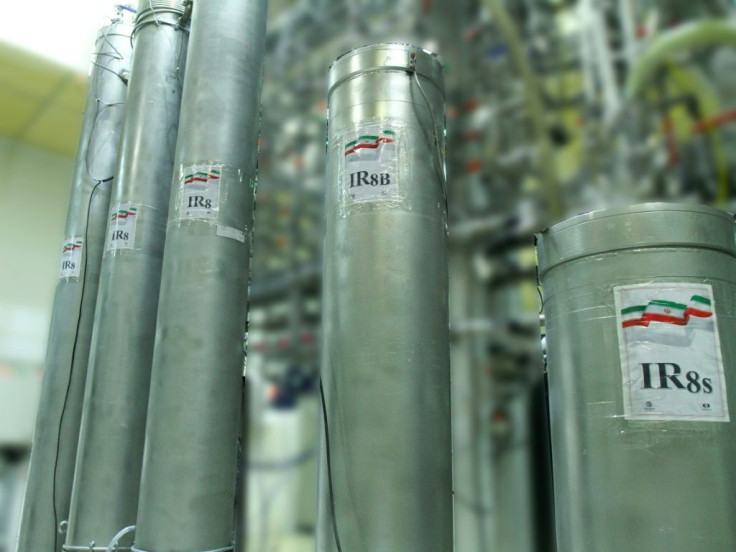Israel Warns Iran Could Have Nuclear Bomb By End Of The Year

KEY POINTS
- Israeli army intelligence said Iran could have a missile carrying nuclear warhead in two years
- Netanyahu has called for harsher sanctions on Iran
- Iran is constrained by weak finances, poor economy
Israeli army intelligence officials warned that Iran may have enough enriched uranium to manufacture a nuclear bomb by the end of the year, as well as a missile capable of carrying a nuclear warhead within the next two years.
Specifically, army intelligence estimated, at current rates of progress, Tehran will be capable of producing 1,300 kilograms of low-enriched uranium in order to generate 25 kilograms of highly enriched uranium by the end of 2020.
However, Israeli intelligence also contended that Iran is not currently interested in the rapid development of a nuclear bomb as Iran’s Supreme leader Ali Khamenei is aware that such a project would likely lead to military strikes against Iran.
Under terms of the 2015 nuclear agreement, known as the Joint Comprehensive Plan of Action, Iran submitted to limiting its enrichment of uranium and to allow United Nations inspections in exchange for the suspension of economic sanctions. However, U.S. President Donald Trump pulled out of the deal in May 2018 and slapped harsh sanctions against Iran to pressure Teheran to negotiate a better nuclear deal.
After the recent assassination of commander Qassem Soleimani by U.S. drones, Iran said it will no longer impose limits on its production of enriched uranium as mandated in the 2015 agreement.
But Israel’s intelligence arm also believes that Iran, facing economic malaise and street protests, would likely not challenge Israel anytime soon.
Israel estimated that of Iran’s $115 billion budget for 2020, almost two-thirds is expected to come from oil revenues. However, due to sanctions on Iran, it only earned $10 billion from oil sales last year, thereby creating a revenue shortfall of $50 billon. In September 2019, for example, Iran exported only 300,000 barrels of oil a day, down from 2.8 million in April 2018.
As a result, Iranian leaders are very constrained despite their threatening rhetoric.
The United States, and in particular Trump, have declared that Iran will not be permitted to develop nuclear weapons.
Some Israelis are deeply worried.
"Iran, despite the nuclear program's restrictions, continues to produce missiles coming into our territory and has doubled its enriched uranium," said Aviv Kochavi, chief of general staff of the Israel Defense Forces "We understand that the possibility of reaching a conflict or more than that against Iran is not an unreasonable one. As long as there is no response to the expansion of the nuclear program, at some point it may leave the realm of strategic dialogue and move to a real capability, that from now on a bomb can be built.”
A potentially nuclear Iran poses grave danger for Israel.
Prime Minister Benjamin Netanyahu, who aggressively campaigned against the 2015 deal, has again asked Western countries to reimpose tough sanctions on Iran.
“We know exactly what is happening with the Iranian nuclear program,” Netanyahu said. “Iran thinks it can achieve nuclear weapons. I repeat: Israel will not allow Iran to achieve nuclear weapons.”
Analysts in Israel are concerned about Iran’s nuclear ambitions, but some caution that Iran has so many other problems it does not have the resources or motivation to launch a serious nuclear arms program.
“I don’t think in Jerusalem there’s someone who believes, if Iran is months away from a bomb, that President Trump ahead of elections will do something on his own,” said Raz Zimmt, an Iran expert at Israel’s Institute for National Security Studies, or INSS. “[Trump] might tell an Israeli prime minister ‘You have a green light to act,’ but this is not something an Israeli prime minister would like to consider. The bottom line is we are in a very risky situation right now. With all the damage [conventional ballistic] missiles can do, they cannot eliminate the state of Israel. But nuclear weapons can do that.”
Ephraim Asculai, a former official of the International Atomic Energy Agency and now a senior researcher at INSS, warned that the 2015 nuclear deal is “dying because Iran is really withdrawing slowly from all prohibitions of the deal. It was not a good deal to begin with, but it’s getting worse now. As the Iranians accumulate more enriched uranium, the situation is getting more dangerous.”
But Meir Javedanfar, an Iranian-born Israeli lecturer at the Interdisciplinary Center-Herzliya, a private research college, is more optimistic, noting that Iran is still allowing inspections of its atomic sites.
“The question is political will: whether they want to make a nuclear weapon or not,” Javedanfar said. “I don’t think they want that. What I think the Iranians are doing by taking these steps on removing limitations on enrichment and number of centrifuges is to strengthen their hand in negotiations with America. If there is a Democrat in the next White House or if Trump is re-elected they know they will have no other choice but to sit down and talk to them. They will have no other choice because of the economic situation.”
© Copyright IBTimes 2025. All rights reserved.





















